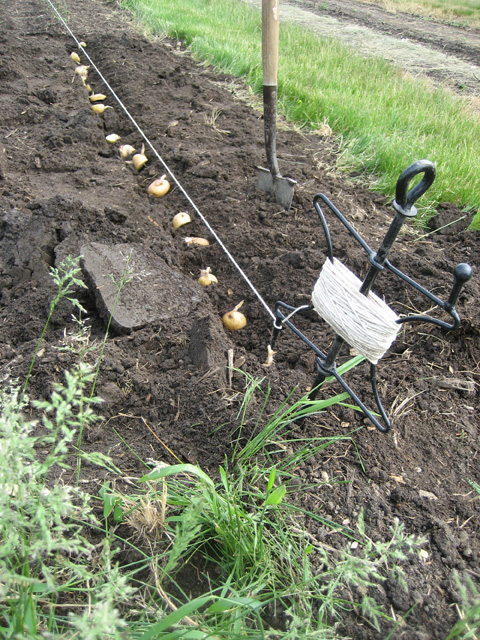More on Potatoes
Last week I started talking about potatoes. This week I’d like to continue the discussion.
How Deep to Plant
If you are planting seed potatoes (little bits of potato), you will need to put them 10 to 12 inches into the ground. If you’re using potato transplants, plant them as deep as they are in the pot you’re transplanting from or slightly deeper. You won’t hurt the plant by burying some of the stem.
Choose the spacing based on the size of potatoes you are looking to harvest at the end of the season. To produce a large number of big potatoes, plant 12-14 inches apart; planting 6-8 inches apart will yield smaller potatoes. Organize your potato patch with both types of spacing to produce a variety of sizes.
When planting, put a handful of bonemeal or compost into the bottom before you place the potato in. This will help provide nutrients which are so essential for potato growth.
Potato Maintenance
Potatoes will begin to sprout within two weeks of planting. As they are growing, hill up soil around the stem to keep the soil from drying out quickly.
Do not add a high nitrogen fertilizer to your potato plant! Nitrogen fertilizers produce top growth (it’s why our spring lawn fertilizers are higher in nitrogen than our fall ones). Fertilizers higher in phosphorus are better for underground growth.
Keep the soil evenly moist – potatoes need a decent amount of water or they will crack.
Potatoes for Small Spaces
Potatoes are easily grown in containers on sunny balconies. The biggest challenge is finding a container deep enough. You’ll need something about 2 feet deep. I recently added the Reusable Potato Planting Bag to the Mark’s Choice lineup. It’s great for small spaces!
Remember that containers will dry out faster than plants in a garden so keep a close eye on the moisture level of your potato container.
The Dreaded Beetle
The Colorado Potato Beetle has to be the biggest deterrent for home owners when they think about growing potatoes. They can defoliate a large plant in a day – a real nuisance but you have chemical-free options:
- A floating row cover: this creates a physical barrier between your potatoes and the beetles. It won’t block the sun so it won’t hinder photosynthesis.
- Mulch, mulch, mulch! Weed-free straw mulch is a great addition to a potato crop. Besides confusing the potato beetles, it will keep weeds down and prevent moisture from evaporating quickly.
- Inspect your plants daily. Eggs are yellow-orange, oval-shaped, and found on potato leaves. Destroy egg clusters, larvae, and adults as you see them. There can be 1-2 generations per year so you will have to monitor your plants all season.
- Finally, don’t plant potatoes in the same spot year after year. I’ve been told that digging a deep trench and lining it with a plastic garbage bags will keep the beetles from reaching your potatoes but I can’t say that I’ve tested this theory myself.
Do you have tips for keeping potato beetles at bay? Leave me a comment on my Facebook page, I’d love to hear your suggestions!




